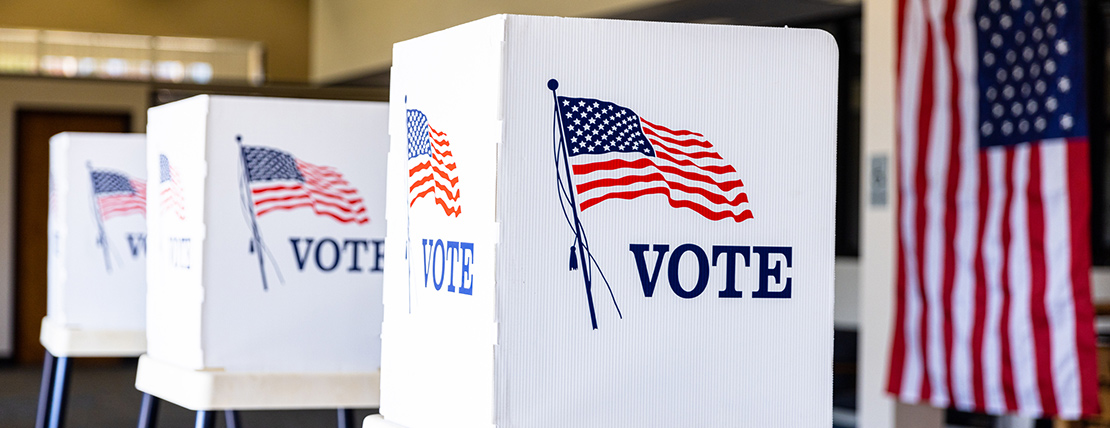- Some time off policies are dictated by state law. Nearly half of U.S. states mandate that employers provide employees paid time off to vote.
- Apply fairness to a corporate policy. Voting benefits should apply equally across an organization’s workforce.
- Give workers flexibility to fulfill their civic duty. Consider offering adjustable schedules and options for employees to vote early or on election day.
Patagonia made news recently when the outdoor apparel company announced it will close its stores, warehouses and offices on Tuesday, Oct. 29, for national Vote Early Day. The company’s more than 2,000 U.S. employees will receive a paid day off and have the entire day to vote early and volunteer.
Given that news snippet and the proximity to the November U.S. elections, perhaps it is timely to ask: What is the current state of employee voting benefits?
The answer: Voting benefits are on the rise, and experts believe they’re here to stay.
“Most small and large employers have moved toward some sort of paid leave for voting, either on election day itself or during their state’s early voting period,” said Tyler Hagenbuch, a voting rights attorney and principal at Tyler Hagenbuch Strategies.
Prominent companies besides Patagonia that have announced paid time off to vote programs for their employees include Coca-Cola, Nike, PayPal and Uber.
“Employers recognize that no one should have to choose between their paycheck and their right to vote, and providing paid leave to vote is an easy way to reward employees and build positive culture,” Hagenbuch said.
State Mandates Give Employees Time to Vote
Policies like making election day an official company holiday or completely closing all stores on election day are becoming more common each election cycle, but they’re still far from the norm, Hagenbuch said.
While there is no federal mandate that employers provide voting benefits, there are currently 21 states that do mandate that organizations provide employees paid time off to vote, and seven additional states require employers to allow unpaid time off to vote, though the specifics of the laws in each state vary widely.
For example, in Illinois, the rules differ between presidential and primary elections, and in Nevada, the paid time off differs based on the distance between the employer’s physical work location and an employee’s polling place.
“It’s good that states are trying to accommodate voting, but in practice, these laws can be confusing for both employees and employers to implement,” Hagenbuch said. “Companies that put in place clear policies that apply equally to all employees are the ones that tend to stand out.”
Policies should provide paid time off to vote and should allow employees flexibility to vote either on election day or during early voting, Hagenbuch added.
Private Businesses Lead the Way
A strong majority of employers are providing employees time to vote regardless of state mandates. In WorldatWork’s 2024 Total Rewards Inventory of Programs & Practices, 69% of the nearly 1,000 responding organizations reported offering paid time off for employees to vote, and 33% reported offering unpaid time off to vote. These percentages largely held steady across organization size and industry.
“Companies understand that their stakeholders — employees and customers alike — want to be associated with brands that reflect their own values,” Hagenbuch said. “Research shows Gen Z employees, in particular, want their employers to be socially conscious and socially active. As a result, you’re seeing a real effort by companies to find ways to increase their civic engagement, often on a local level in their own communities.”
Patagonia has encouraged its community to “vote for the planet” since its founding in the 1970s, said J.J. Huggins, the company’s communications manager and a project manager for the Time to Vote program. The Time to Vote coalition was cofounded by Patagonia, Levi Strauss & Co. and PayPal in 2018 and now boasts a roster of more than 2,000 organizations that have committed to giving employees time to vote.
“Patagonia is in business to save our home planet, and voting is a priority for us because democratic participation lays the foundation for progress on every issue we care about,” Huggins said.
Patagonia first closed its operations for Election Day in 2016, giving all employees a paid day off. It has closed for every presidential and midterm election since. Huggins believes this year’s Vote Early Day is the natural progression of these efforts.
“We’re asking our employees to vote early and then volunteer to help get out the vote by knocking on voters’ doors, phone banking, text banking and letter writing,” Huggins said. “We’re working with the League of Conservation Voters to provide these volunteer opportunities to our employees and customers. There will be more work to do on Vote Early Day as opposed to Election Day, which is the last day to vote.”
Even if a company can’t close for the day, people usually only need two or three hours to vote, Huggins said.
“HR teams and people managers can come up with creative solutions [such as those utilized by Patagonia and others] to ensure employees have time for their civic duty,” he said.
Editor’s Note: Additional Content
For more information and resources related to this article, see the pages below, which offer quick access to all WorldatWork content on these topics:








